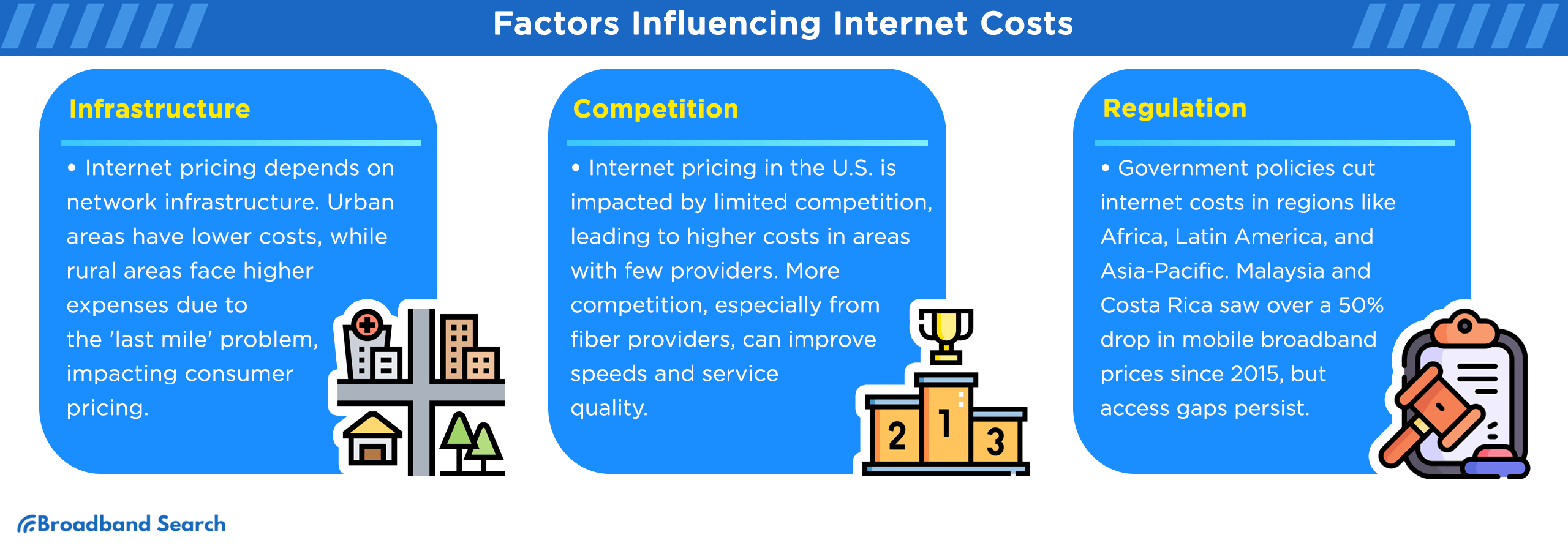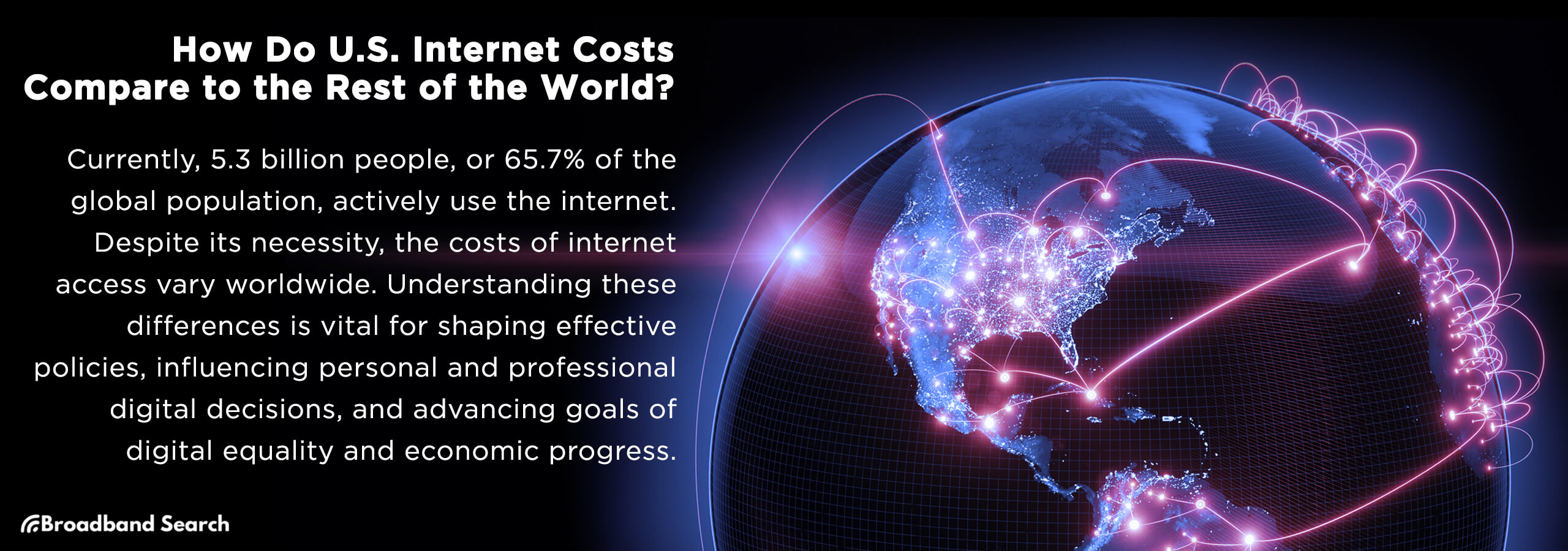With nearly 5.4 billion internet users worldwide, the internet has become a daily necessity. However, the cost to get online varies significantly from country to country. Understanding these differences is key to seeing the global landscape of digital access and shaping effective internet policies.
This guide explores how internet costs in the United States compare to the rest of the world. We will look at the factors that drive these prices and what trends might tell us about the future.
Key Takeaways:
- The average monthly cost for internet in the United States is around $65.
- Infrastructure, competition, and government regulation are the primary factors that influence internet prices.
- U.S. internet is pricier than in much of Europe and Asia, but still more affordable than in many parts of Africa and Latin America.
- Even with decade-long price declines, millions of Americans remain without affordable high-speed internet, particularly in rural areas.
Internet Costs in the U.S.
The cost of internet in the U.S. often depends on the type of connection available. According to Forbes, here are the average monthly prices for common internet service options:
- DSL: $50 per month
- Cable: $65 per month
- Fiber: $67 per month
- Satellite: $90 per month
While these costs may seem like a small fraction of the average U.S. household income, the financial impact varies depending by family and the plan they choose.
Factors Influencing Internet Costs in the U.S.

Network Infrastructure
Building and maintaining network infrastructure is expensive. In densely populated urban areas, it is generally cheaper to connect more homes, leading to lower prices for consumers.
In contrast, rural areas often face what is known as the last mile problem. Extending service to remote regions is expensive for providers, which results in higher costs for customers in those areas. This urban-rural divide is a significant factor in pricing disparities across the country.
Internet Provider Competition
Market competition — or the lack of it — also plays a critical role. Over 200 million Americans live in areas with only one or two reliable high-speed internet providers. Limited choices often lead to higher prices. In markets with more providers, especially from new fiber companies, consumers tend to see more competitive pricing and better service quality.
Government Regulation
Government policies can significantly impact internet costs. The federal government has committed billions to expand broadband access, especially in underserved areas:
- The 2021 Bipartisan Infrastructure Law allocated $42.45 billion for the Broadband Equity, Access, and Deployment (BEAD) Program to make high-speed internet universally accessible by 2030.
- The USDA’s ReConnect Program provides loans and grants to build broadband infrastructure in rural communities.
These initiatives aim to close the digital divide—the inequality of internet access between urban and rural populations—but approximately 8.5 million U.S. locations still lack access to high-speed internet.
Global Comparison of Internet Costs
To understand how the U.S. compares internationally, here’s the baseline average from TodayTesting:
- United States — $67.57 per month, 136.48 Mbps, $0.49 per Mbps
U.S. vs. Europe
Internet in Europe is generally more affordable than in the U.S. This is largely due to:
- Regulated Competition: Many EU nations promote competition by requiring network owners to grant access to other providers. This open access model leads to more choices and lower prices.
- Population Density: Europe’s denser urban centers make it cheaper to build out networks.
CountryAvg. Monthly CostAvg. Speed (Mbps)Cost per MbpsFrance$34.55152.45$0.23Netherlands$51.72142.49$0.36Spain$38.74134.42$0.29 Source: TodayTesting
U.S. vs. Asia
Many Asian countries, particularly technology hubs like Taiwan and Japan, offer excellent value. A focus on innovation and infrastructure has created competitive markets with high speeds and low prices.
CountryAvg. Monthly CostAvg. Speed (Mbps)Cost per MbpsTaiwan$26.89153.51$0.18Japan$37.28124.70$0.30South Korea$20.96102.34$0.20 Source: TodayTesting
U.S. vs. Africa
Africa faces significant challenges with internet accessibility. On average, the internet here is the most expensive in the world relative to income. According to the Alliance for Affordable Internet, many Africans pay nearly 9% of their monthly income for just 1GB of data.
According to World Bank Group, achieving universal, affordable internet in Africa by 2030 will require a $100 billion investment.
CountryAvg. Monthly CostAvg. Speed (Mbps)Cost per MbpsSouth Africa$52.7025.68$2.05Kenya$37.7619.34$1.95Nigeria$55.0311.66$4.72 Source: TodayTesting
U.S. vs. The Americas
Within the Americas, U.S. internet prices are among the highest. This is influenced by a combination of higher labor and material costs for infrastructure projects and a less competitive market in many areas compared to other countries in the region.
However, the U.S. also offers faster average speeds, which can make the cost per Mbps appear more favorable.
CountryAvg. Monthly Cost (USD) Avg. Speed (Mbps)Cost per MbpsCanada$64.09175.7$0.36Costa Rica$48.5268.3$0.71Mexico$29.9650.6$0.59Brazil$20.8195.0$0.22Argentina$18.3855.4$0.33 Source: Numbeo
Final Thoughts: It Costs a Lot for Countries to Get Online
While internet prices in the U.S. have been declining, it lags behind many developed nations in Europe and Asia when it comes to affordability. The high cost is largely driven by a lack of competition and the expense of building infrastructure in less populated areas.
Government initiatives aim to bridge the digital divide, but there is still work to be done. Affordable internet is more than a convenience—it’s a necessity for global participation in the digital economy. Closing access gaps will require ongoing innovation, investment, and policies that prioritize equity.
FAQ
How much does internet cost per month in the U.S.?
The average household in the United States pays about $65–$70 per month for internet service. Costs vary depending on the connection type.
DSL is typically cheaper, while satellite tends to be the most expensive.
What is the average internet cost per month worldwide?
Globally, the average internet cost per month is lower than in the U.S. Many European countries, like France ($34.55/month) and Spain ($38.74/month), offer service at nearly half the U.S. average. Meanwhile, countries in Asia, such as Taiwan ($26.89/month) and Japan ($37.28/month), deliver even lower costs with high speeds.
Why is the internet more expensive in the U.S. than in Europe or Asia?
Higher infrastructure costs, limited competition, and rural coverage challenges drive U.S. prices up. In contrast, Europe’s regulated competition and Asia’s dense urban populations allow for lower monthly rates and faster speeds.
How do U.S. internet costs compare to Africa and Latin America?
While U.S. prices are higher than in much of Europe and Asia, they are often more affordable on a cost-per-speed basis than in Africa, where limited infrastructure makes service expensive (e.g., Nigeria averages $55/month for just 11 Mbps). In Latin America, monthly prices are lower in dollar terms — such as Brazil ($20.81/month), but speeds are generally slower.
What is the cost of internet in the United States?
Check out this state-by-state guide to internet service prices in the United States to see how broadband costs vary across the country.

